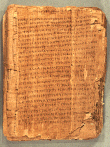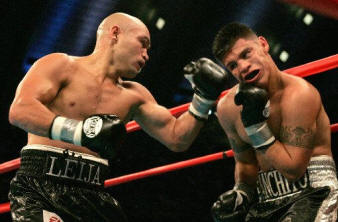How to Belabor Your Body
Now, then, thus am I racing, not as dubious, thus am I
boxing, not as punching the air, but I am belaboring my body and leading it into
slavery, lest somehow, when heralding to others, I myself may become
disqualified" (First Corinthians 9:26-27).
Belaboring my body. Is this an invitation to manhandle the flesh, that we
might somehow force ourselves into conformity to Christ? Is this the apostle
Paul’s appeal to self-inspired piety and the studied neglect of the body? We
shall soon see.
 Paul digs his pen into the hardwood table that is the centerpiece of his
sparsely furnished room in Ephesus. On this cool evening in the Spring of 56,
Paul is drafting a letter to the believers in Corinth. Paul digs his pen into the hardwood table that is the centerpiece of his
sparsely furnished room in Ephesus. On this cool evening in the Spring of 56,
Paul is drafting a letter to the believers in Corinth.
Corinth is the capital of Roman Greece. It’s a wealthy commercial center, but
it’s also home to the intellectual elite; something like our Berkeley. But
Corinth is also a hotbed of the flesh.
Paul is astonished by the accounts brought him; even the believers there are
reflecting the unrest of the city. Not only are they split into factions, but
their gatherings are a mixture of confusion, uproar and the pitting of one
spiritual gift against another. They can’t even break bread right. Instead of
satiating their hunger at home, they are coming to the Lord’s table hoping for
a free meal.
There are also problems with the women; they are outraging the ecclesia by
addressing mixed meetings unveiled. Not only this, but believers are defrauding
one another in business and taking their cases before unbelievers. But these
were minor matters.
Some of the believers are backsliding into immorality. Their excuse?
"All things are allowed us in Christ, aren’t they?" They have a
point. But still there is more. The church leaders are looking the other
way at a certain glaring case of incest.
You can see now why Paul wanted to write the Corinthian ecclesia. After all,
he was the one who had told them about Christ. Paul knew that he had to address
these problems. But how would he do it?
Appreciate Paul’s dilemma. If he told the Corinthians: "Do this, but
don’t do that," they would think he was reverting to the very law
he was declaring freedom from. Yet, if he emphasized the truth that "all
things are allowed" (and it is a truth), he might accelerate
the downward spin of the church. What to do? What to say? For once, the apostle
is speechless.
This is why we find him at his table—tap, tap, tapping it with the point of
his pen, his chin buried deep into the palm of his right hand. Fortunately, Paul’s
favorite scribe, Tertius, was in the next room shaving.
"Tertius! Come here quickly. I need you."
"Have you invented the telephone?"
"I’ve something important to discuss with you."
"Just a moment."
Tertius knew better than to keep Paul waiting. He knew that Paul had been at
the desk for hours and was probably struggling, as often he did, with words. struggling, as often he did, with words.
Tertius appeared in the doorway, rubbing his face, a small spot of lather
still attached to the lobe of each ear. "What’s up?"
"I’ve got a problem, Tert. I’m well into this letter to the
Corinthians, but I’ve come to a standstill. How do you tell somebody to
discipline himself without telling him to outright discipline himself?"
"You got me," Tertius said. Tertius continued to rub his fingers
along his beardline. "What’ve you got so far?"
"I’ve just talked about my rights as an apostle, the right to eat,
drink, take a believing wife, live off the evangel, etcetera, but how I don’t
use these rights but endure all things so that I don’t hinder the evangel of
Christ. Now I’m talking about how I become a Jew to the Jews, as one under the
law to those under the law, as one without the law to those who are free from
the law, all for the sake of the evangel. I want these people to understand that
they, too, should be crucifying their rights so that they don’t become sloppy
in their Christly service."
"Pretty good so far."
"I want them to k now that not only must they be beating down the urge to
exercise these rights, but that they should be beating down every urge of
the body that exalts itself above the knowledge of Christ. And that’s the
problem, Tert. I don’t want to throw the stone commandments back in their
faces after telling them the truth of grace and their freedom in Christ. But
neither do I want them to keep sinning. I guess I want to..." now that not only must they be beating down the urge to
exercise these rights, but that they should be beating down every urge of
the body that exalts itself above the knowledge of Christ. And that’s the
problem, Tert. I don’t want to throw the stone commandments back in their
faces after telling them the truth of grace and their freedom in Christ. But
neither do I want them to keep sinning. I guess I want to..."
"To tell them to shape up without shipping out."
"Precisely! So, um, what do you think?"
Tertius walked slowly around Paul’s table. His eyes were on the floor, his
right hand ever at his chin. Stopping suddenly and turning toward Paul, he
slammed the big desk with his fist. "I’ve got it! Tell ‘em they’ve
got to beat their bodies black and blue and bring themselves under
subjection to Christ!"
Tertius looked like a puppy waiting for a bone from his master. Paul merely
ground his head into both hands with a long moan. "No, no, no,
Tertius! People can’t beat themselves into conformity to Christ!
Self-imposed discipline was invented by men!"
Tertius took Paul’s response like a newspaper swat to the rump. "I
knew that. Self-imposed discipline was invented by men. What do you think
I’ve been trying to tell you all these years, Paul?"
"Tertius. Please. What have we to do with self-imposed discipline
and severe treatment of the body? Think about it. I realize that
those who practice such feats of asceticism have a reputation for wisdom, but
these things aren’t of any value as a remedy against the indulgences of
the flesh. In fact, they actually pamper the flesh."1
Now Paul laid his head down on the table. Tertius knew when to leave the
apostle alone, so he quietly returned to the washroom.
Paul once wrote to the Colossians: "Deaden, then, your members that are
on the earth: prostitution, uncleanness, passion, evil desire and greed, which
is idolatry (3:5)." Yet, shortly before that, he had instructed them:
"Be disposed to that which is above, not to that on the earth (3:2)."
At first glance, this seems to be a contradiction. One minute, Paul doesn’t
want the Colossians minding things of earth. Next, he tells them to put to death
their members that are on the earth. Let’s glance again. Is it somehow
possible to deal with earthly things while, at the same time, paying them no
mind?
The popular answer to that question, then and now, is: "No! We must
crucify every desire!" But the writer of this article has read Paul. And he
also has the advantage, sitting at his desk, of knowing how Paul is going to
finish the letter he’s working on. Let’s put Paul and Tertius on hold for a
moment and hash this out. I really do believe that it’s possible to deal with
flesh and ignore it at the same time.
The most efficient way to deal with flesh, and to keep one’s mind
focused heavenward, is simple: Have a single eye to God.
Jesus said, "The lamp of the body is your eye. If, then, your eye should
be single, your whole body will be luminous." (Matthew 6:22). Keep your eye
on Him, Jesus said, and you won’t have to worry about the body; it will
take care of itself.
As an example, consider the pupil of your eye. If someone commanded you to
contract it, what would be the best way to do it? Get your thick, dirty fingers
in there and squeeze the delicate organ into shape? Of course not. Yet
this is the way many believers handle their flesh when, studying Paul, they hear
his exhortation: "Deaden your members that are on the earth!" Off they
all go to make strawberry preserves with the monks—all in hopes of squelching
their flesh. But, as Paul said earlier to Tertius, this only pampers the
flesh. That’s because the human heart is such that people are even proud of
being monks. The flesh loves attention, and will get it any way it can, whether
one attempts to squelch or satiate it.
Back to the contraction of your pupil. Why not make the sun do the
work? Simply tilt your head toward the sun, and
 your pupil will contract. It’s
a natural example of cause and effect. No mess, no tears, no dirty fingerprints
on the cornea. your pupil will contract. It’s
a natural example of cause and effect. No mess, no tears, no dirty fingerprints
on the cornea.
Now consider how this applies to flesh. I tell you: "Conform your flesh
to the image of God!" Very softly and quietly, then, tip back your head and
look to the Son. Make Him do the work. It’s a spiritual example
of cause and effect. Just keep an eye to Him, Jesus said, and the rest of the
body will fall in line, not instantly, but at a sane rate of speed chosen by the
all-wise God.
There is a stirring in Paul’s sparsely furnished room in Ephesus. Let’s
return there.
Paul suddenly raised his head from the table. What had Tertius said about
beating the body black and blue?
"Tertius! What did you say about beating the body?"
Tertius had returned from the washroom and was now staring vacantly out the
window. "I repented of that, Paul. After all, such feats of asceticism have
a reputation of, um..."
"Tertius! I think what you said may have made some sense."
"Like I said, Paul, I repented of it, and I’m sure that, given time,
the Lord will........some sense, you said?"
"Yes. I liked the boxing analogy. Can you elaborate on
that?"
Tertius turned back to Paul, looking pleased. "Sure. If you buffet your
body until it’s knocked out, you will have done away with it. Zappo. No more
flesh."
"Do you keep swinging and swinging at it until it’s subdued?"
"I don’t know. I guess you do."
Paul suddenly burst from his chair and began pacing the room. "Tertius!
What boxer wastes his energy punching various inconsequential targets on his
opponent’s body, when he could knock him out with one, well-aimed
blow?"
"A bad one?"
"A bad one, indeed!" Now Paul stopped, swung around, and extended
his arms toward the befuddled scribe. "Tertius! You and I have seen enough
fights at the Isthmian Games. What puts out an opponent faster than anything? A
blow to the stomach? The chest? A feeble volley into the arms?"
"No," Tertius said. "A blow to the eye will stop any
opponent, even a well-trained one. I’ve seen plenty of fights that were
stopped because a boxer got his eye smashed from one, good blow."
"Exactly, Tert! If he was fit, strong, and otherwise capable, none of it
mattered if he sustained a well-aimed blow to the eye. Right?"
"Right. One good shot to the eye would end the whole thing."
The hem of Paul’s tunic fluttered about his ankles as he hurried to his
friend and slapped him on the back. "And if your eye should be
single, Tertius, then the whole body will be luminous!"2
Tertius ran to the table where Paul’s parchment lay and quickly picked up
the pen. "I’m ready," said Tertius. "Go."
"Now then, thus am I racing, not as dubious," Paul boldly dictated.
"Thus am I boxing, not as punching the air."
 And here Paul paused, concentrating, searching for just the right word. It
came to him by the inspiration of the Spirit. It was a very familiar word to
him: hupopiazo. It was a word derived from "hupopion," which
meant "the part of the face under the eyes."3
Hupopiazo meant: To blacken by a blow that part of the face which is under the
eye.4 And here Paul paused, concentrating, searching for just the right word. It
came to him by the inspiration of the Spirit. It was a very familiar word to
him: hupopiazo. It was a word derived from "hupopion," which
meant "the part of the face under the eyes."3
Hupopiazo meant: To blacken by a blow that part of the face which is under the
eye.4
Paul sighed with relief. It always felt so good when God at last gave him the
perfect word. "But," he continued, "I hupopiazo my body
and lead it into slavery, lest somehow, when heralding to others..." he was
looking at Tertius now, "...I, myself, may become disqualified."5
Paul now leaned his left shoulder against the wall. His legs were crossed,
his arms folded. He was exhausted, yes, but there was a smile of satisfaction on
his face.
Tertius scratched furiously at the papyrus for a few moments, then finally
laid down the pen with a triumphant little plop. The two men eyed one another
and grinned.
"Do you think they’ll get it?" Paul asked.
"By the grace of God, they will!" Tertius said.
Then the two friends went into the dark city to buy bread.
Photo credits: Shave dude by "ElvertBarnes"; sun by "Tony the
Misfit"; Creative Commons License; Attribution
1Colossians 2:22-23. Kenneth
Wuest and J.B. Phillips translations.
2Paul probably never read
Matthew 6:22, but it’s an interesting thought
3NASB Exhaustive
Concordance, page 1690, #5299.
4Concordant Literal New
Testament, Keyword Concordance, Page 28.
51C 9:26-27.
|
 Paul digs his pen into the hardwood table that is the centerpiece of his
sparsely furnished room in Ephesus. On this cool evening in the Spring of 56,
Paul is drafting a letter to the believers in Corinth.
Paul digs his pen into the hardwood table that is the centerpiece of his
sparsely furnished room in Ephesus. On this cool evening in the Spring of 56,
Paul is drafting a letter to the believers in Corinth. struggling, as often he did, with words.
struggling, as often he did, with words. now that not only must they be beating down the urge to
exercise these rights, but that they should be beating down every urge of
the body that exalts itself above the knowledge of Christ. And that’s the
problem, Tert. I don’t want to throw the stone commandments back in their
faces after telling them the truth of grace and their freedom in Christ. But
neither do I want them to keep sinning. I guess I want to..."
now that not only must they be beating down the urge to
exercise these rights, but that they should be beating down every urge of
the body that exalts itself above the knowledge of Christ. And that’s the
problem, Tert. I don’t want to throw the stone commandments back in their
faces after telling them the truth of grace and their freedom in Christ. But
neither do I want them to keep sinning. I guess I want to..." your pupil will contract. It’s
a natural example of cause and effect. No mess, no tears, no dirty fingerprints
on the cornea.
your pupil will contract. It’s
a natural example of cause and effect. No mess, no tears, no dirty fingerprints
on the cornea. And here Paul paused, concentrating, searching for just the right word. It
came to him by the inspiration of the Spirit. It was a very familiar word to
him: hupopiazo. It was a word derived from "hupopion," which
meant "the part of the face under the eyes."
And here Paul paused, concentrating, searching for just the right word. It
came to him by the inspiration of the Spirit. It was a very familiar word to
him: hupopiazo. It was a word derived from "hupopion," which
meant "the part of the face under the eyes."